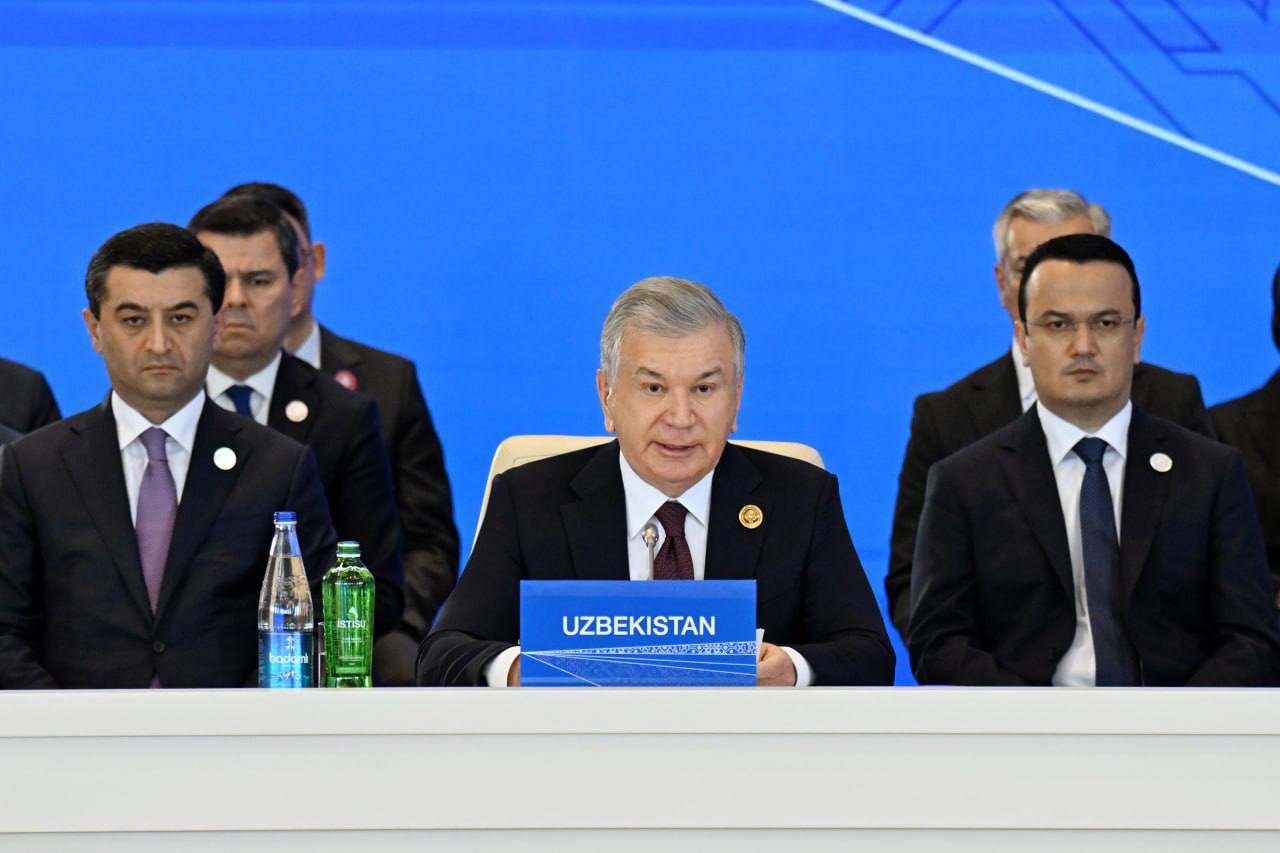President Shavkat Mirziyoyev participated in the 17th Summit of the Economic Cooperation Organization (ECO) in Khankendi, Azerbaijan, on July 4, the presidential press service reports.
The event, chaired by the President of the Republic of Azerbaijan, Ilham Aliyev, was also attended by the President of the Islamic Republic of Iran, Masoud Pezeshkian; the President of the Kyrgyz Republic, Sadyr Japarov; the President of the Republic of Tajikistan, Emomali Rahmon; the President of the Republic of Turkey, Recep Tayyip Erdoğan; the Prime Minister of the Islamic Republic of Pakistan, Shehbaz Sharif; the Prime Minister of the Republic of Kazakhstan, Olzhas Bektenov; the Deputy Chairman of the Cabinet of Ministers – Minister of Foreign Affairs of Turkmenistan, Rashid Meredov; the Acting Deputy Prime Minister of Afghanistan, Mullah Abdul Ghani Baradar; the Secretary-General of the ECO, Asad Majid Khan; as well as heads of delegations from several other states and regional organizations.
The prospects for the further development of multifaceted cooperation within the ECO were considered, and an exchange of views on pressing international and regional issues took place.
At the beginning of his speech, the President of Uzbekistan noted the contemporary challenges to security and sustainable development.
The leader of Uzbekistan reiterated the importance of resolving conflicts and disputes through diplomacy and constructive negotiations.
It was emphasized that achieving peace and stability in the Middle East is impossible without a just resolution of the Palestinian-Israeli conflict.
Turning to the agenda of the meeting, the President of Uzbekistan drew attention to a number of pressing issues.
First and foremost, in order to advance the development priorities of the Organization in the medium and long term, the importance of adopting the concept of “Strategic Goals of Economic Partnership – 2035” was noted. In addition to traditional areas of cooperation, the document should pay special attention to strengthening cooperation in the fields of innovation, artificial intelligence, and digital technologies.
Issues of simplifying trade in goods and services, the gradual elimination of technical and non-tariff barriers, and the development of e-commerce remain particularly relevant.
To discuss strategic issues in this direction and adopt the Trade Facilitation Agreement, it was proposed to hold a meeting of trade ministers in Tashkent this year.
The head of state also initiated the creation of a system of “green corridors” for the prompt exchange of information on trade in agricultural products and their unhindered delivery.
The importance of adopting a long-term “EcoInvest” program to bring investment cooperation to a new level and create a more transparent and attractive investment environment was emphasized.
“The main goal of the program should be the wide involvement of private investors, banks, and international financial institutions in promising projects in our region,” emphasized the leader of Uzbekistan.
The formation of alternative transport corridors was identified as a strategic priority in the current geopolitical environment. It was noted that the China – Kyrgyzstan – Uzbekistan railway project, which in the future could be integrated with the promising Trans-Afghan corridor, will effectively connect transit networks in a vast region.
The head of our state also proposed accelerating the establishment of a Digital Transport and Customs Department to establish systematic work on the digitalization of the transport and logistics sector.
“Our current tasks are to open new air routes in the region, introduce innovative formats of cooperation between airlines, and develop integrated marketing strategies in the fields of tourism and aviation,” said the head of Uzbekistan.
In order to discuss these issues, it was proposed to organize a forum of national airlines in Samarkand this year.
The existence of great potential for doubling tourist flows was noted. The adoption of a “road map” to expand tourism services within the Organization will contribute to achieving this goal.
Noting the importance of joining efforts in addressing the global climate agenda, the President initiated the development of a cross-border “green program” to create forests and recreational areas in desert territories.
Positively assessing the work of the High-Level Committee, the leader of Uzbekistan proposed instructing it to prepare specific recommendations for improving the activities of the ECO by the next summit.
“The reforms will serve to develop our cooperation at a new level and further strengthen the authority of the Organization in the international arena,” noted the President.
In conclusion, the head of our state expressed confidence that the current summit will give a powerful impetus and open a new stage in multifaceted practical cooperation within the Economic Cooperation Organization.

